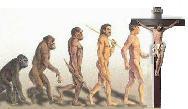The Divine Stagnance: 2
 Here are the second and third articles. The second is basically just a general case of the first. The third deals with the detriment of stalling progress.
Here are the second and third articles. The second is basically just a general case of the first. The third deals with the detriment of stalling progress.SHOULD MORALS HAVE A VOICE IN SCIENCE?
It would be quite ridiculous to state that morals should play absolutely no role in science, as issues of rights and consent are undoubtedly important. However, the effects of morality on science should be very carefully controlled. What must be understood is that morals do not constitute a static body, but rather fluctuate continuously. Morals represent what we as a people consider to be 'right' to the best of our knowledge at any one time. Consequently, morals at any one time may be, and are very likely to be, wrong. This is not to say that morals should be utterly disregarded, they are after all the best we have. However, when morals are not clear, when a significant gray area exists, it may prove best to take a hands-off approach to advancements in science. The reason for this is simply because a moral gray area is a good indication that the best of our knowledge is not enough. In other words, the only way to give definition to such a moral gray area is to actively encourage research in that area. The emerging facts will provide the raw materials necessary for successful philosophy. The fact that morals, especially ill defined morals, normally act against the progress of science constitutes a fundamental catch 22. A lack of knowledge leads to morals that prohibit the very research able to fill that void.
In history, the use of morals to hider research into misunderstood advancements is ever present. Most of these morals are derived in some way from religious beliefs. We see in the Christian dominated Middle Ages immorality being cited against every major medical advancement including anatomy/surgery, inoculation, vaccination, and even anesthetics, all considered immoral tampering with human life and interfering with the divine will of God. A fundamental ignorance of the natural origins of illness and disease lead to such a set of moral beliefs. This issue is again seen in 1868 when Cardinal de Bonnechose, Archbishop of Rouen and member of the French Senate, ruled that “the tendencies of higher scientific teaching at
CAN THERE BE A BENEFIT TO LIMITING RESEARCH AND STALLING PROGRESS?
In many instances it seems as if particular studies should not be undertaken based on a serious moral concern. We must be careful, however, that we have the relevant knowledge to make such a moral judgment. All too often, a moral issue seems just, legitimate, and insurmountable, but turns out to be based on misinformation, in the light of which, the moral issue dissolves. In such cases, of which many will be shown, the limiting of research is unwarranted and harmful. Knowledge, after all, is of paramount value to mankind, allowing us to continue on through the evolution of our civilization, overcoming the endless stream of new and challenging adversities, and ever adding to the mastery of our environment. To stall progress, for any reason, could prove very dangerous to us as a species in both short and long term considerations.
Today, many people oppose the encouragement and even the very practice of embryonic stem cell research. The opposition comes in many forms, all of which are genuine, well indented, and seemingly in the best interest of mankind at large. However, I would strongly urge advocates of such opposition to explore the history of our scientific development which shows countless examples of such opposition, many of which I will list here at the risk of redundancy, that without fail prove to have been unsound and baseless inhibitions from the perspective of higher science. Further, the results of such stagnancy, ultimately temporary as it was, are often terrible.
I will begin the list of limited research that has wronged mankind in astrology. In about 600 B.C. Pythagoras proposed the revolution of the earth and planets around the sun. Around 100 B.C. it was proposed again by Aristarchus. After Aristarchus the thought was lost until near 1500 where it was written by Cardinal Nicholas de Cusa, and shortly after him by Nicholas Copernicus. Given the position towards science at the time, Copernicus feared releasing his work for nearly thirty years, finally publishing in 1543. This theory was supported in 1601 by Giordano Bruno, and was proved true by the telescope of Galileo in1611. Galileo went on to discover numerous supporting facts such as the phases of Venus and spots on the sun. For all of the work of these men in uncovering this great truth, Aristarchus was charged with blasphemy; Giordano Bruno was hunted, arrested in Venice, imprisoned for six years and finally burned alive; Galileo was denounced, humiliated, made to recant, and eventually placed in the hands of the Roman inquisition where he was imprisoned and tortured; and Copernicus was discredited, escaping further ramifications only through death, but not without documented fear of “vengeance on his corpse.” More disturbing yet, is what became of their great works. The Catholic Church released the Index, a list of all books forbidden to Christians under pain of persecution, including “all books which affirm the motion of the earth.” The Index was forwarded with a signed papal bull. One historian notes that a “mass of books appeared under the auspices of the Church immediately after the condemnation of Galileo, for the purpose of rooting out every vestige of the hated Copernican theory from the mind of the world.” In addition, the Copernican theory was forbidden to be taught almost anywhere in
Another, and more severe, example is apparent in the development of medicine. Again we see the very beginnings of this science in ancient times. In
The result of this enormous delay in the progress of medical science is horrific. This enforced period of ignorance cost the lives of countless millions. The restrictions on anatomical studies brought about “such doctrines as the increase and decrease of the brain with the phases of the moon, the ebb and flow of human vitality with the tides of the ocean, the use of the lungs to fan the heart, the function of the liver as the seat of love, and that of the spleen as the center of wit.” The inoculations of Boylston saved 294 out of 300 people in a particular town, while at the same time traditional treatments allowed one sixth of people to die. Jenner’s much hated vaccination proved itself in
Had men like Versalius, Boylston, and Jenner not risked reputation and life in the name of science, if the opposition had had its way, the terrible scourge of smallpox may have never been overcome. Such dangers to mankind cannot be predicted and, when such threats arise, our knowledge will be our only viable salvation. White sums up this thought upon reflecting on Roger Bacon, a persecuted scientist of the thirteenth century:
“The nineteenth century was robbed at the same time with the thirteenth. But for that interference with science the nineteenth century would be enjoying discoveries which will not be reached before the twentieth century, or even later. Thousands of precious lives shall be lost, tens of thousands shall suffer discomfort, privation, sickness, poverty, ignorance,.for lack of discoveries and methods which, but for the mistaken dealing with Roger Bacon and his compeers, would now be blessing the earth.” [7]

 screaming godhead
screaming godhead


